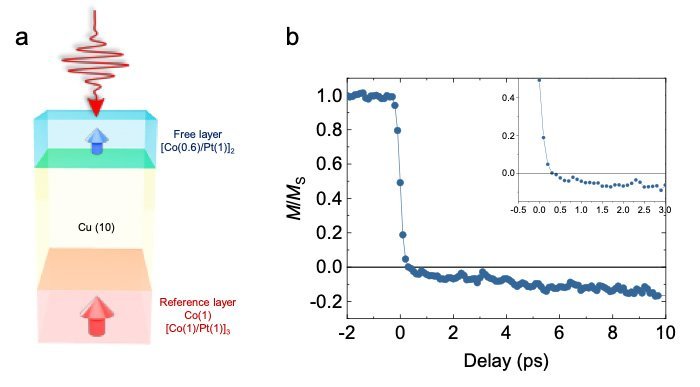ENGINEERING
Tohoku University prof Mangin demos sub-picosecond magnetization reversal in rare-earth-free spin valves

Researchers at the Université de Lorraine in France and Tohoku University in Japan have demonstrated a sub-picosecond magnetization reversal in rare-earth-free archetypical spin valves.
Manipulating magnetic materials without using magnetic fields is of paramount importance for many applications, such as non-volatile memory. Two decades ago, it was discovered that a magnetization reversal could be induced by a charge current. A decade later, a much faster, sub-picosecond control of the magnetization was achieved by shining femtosecond light pulses. This process became known as all-optical magnetization switching. However, only a few specific rare-earth-based material systems containing antiparallel alignment in magnetic sub-lattices experience such ultrafast phenomena.
In their work, the research group demonstrated sub-picosecond optical control of magnetization in rare-earth-free archetypical spintronic structures, consisting of [Pt/Co]/Cu/[Co/Pt], at ultrafast timescales.
Furthermore, they observed magnetization reversal from parallel alignment, which was previously unseen and unexpected in ultrafast magnetism. Like the discovery of magnetization reversal by a charge current two decades ago, this breakthrough has the potential to drastically extend the bandwidth of common spintronic devices. This can be done by exploiting common spintronics phenomena in a strongly out-of-equilibrium context.
"Our findings provide a route for ultrafast magnetization control by bridging concepts from spintronics and ultrafast magnetism," says Dr. Junta Igarashi of the Université de Lorraine (JSPS Overseas Research Fellowships, an alumnus of Tohoku University). Professor Stéphane Mangin of the Université de Lorraine, also serving as a visiting professor at the Center for Science and Innovation in Spintronics (CSIS), Tohoku University, added, "Our findings are a milestone in the development of ultra-fast spintronics and could open the way to new applications for ultra-fast and energy-efficient memories."
The partnership between the Université de Lorraine and Tohoku University is driven, in large part, by the exchanges of graduate and post-doc students. More than a dozen exchanges on both sides have already taken place in recent months. This partnership was supported by Presidents Hideo Ohno and Pierre Mutzenhardt, who signed a consortium agreement in 2019 during the World Materials Forum, by Lorraine University of excellence, and by the sakura science exchange program and JSPS.

